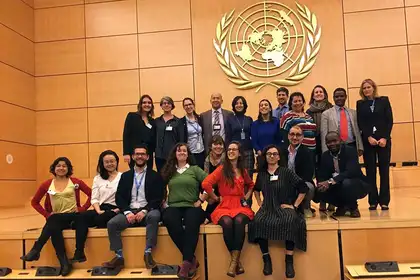
Dr Trisia Farrelly (second from left, standing) at the UN in Geneva with representatives from Centre for International Environmental Law, Environmental Investigation Agency, Centre for Oceanic Awareness, International Pops Elimination Network, Global Alliance for Incinerator Alternatives, Plastic Pollution Coalition, Break Free From Plastic, MarViva, World Wildlife Fund and the Centre for Environmental Justice and Development, Nairobi.
She made global headlines last year warning of the dangers of plastic glitter and other microplastics entering the biosphere and human food chain. Now, Dr Trisia Farrelly is providing expertise for the United Nations Environment Assembly (UNEA) by developing the architecture for a new global treaty to address the issue of toxic plastics filling our oceans.
Dr Farrelly, an environmental anthropologist in Massey University’s School of People, Environment and Planning, has just returned from a week in Geneva, Switzerland, where she took part in the United Nations Open Ended Expert Group Meeting (UNOEEG-2) in Geneva. At the meeting, a range of experts offered options for UNEA to combat the increasingly urgent issue of marine plastic litter and microplastics.
A co-director of Massey University’s Political Ecology Research Centre and co-founder of the New Zealand Product Stewardship Council, Dr Farrelly worked with the taskforce group led by the Centre for International Environmental Law (CIEL) to develop the architecture for a new international, legally binding agreement on plastic pollution. Prior to the meeting, the taskforce presented a ‘thought starter’ to the UNOEEG-2: Toward a new global convention with a multi-layered governance approach to address plastic pollution.
Beyond recycling
Their message is that recycling is not enough, with an expected 33 per cent rise globally in the amount of plastics being produced over the next five years. Their paper states: “Given the more than 335 million tonnes of plastic produced every year – more than eight million tonnes of which enters the oceans – and rising production trends, it is clear that in order to prevent marine and other plastic pollution, a new global Convention on Plastic Pollution is required with a mandate to manage the lifecycle of plastics, including production.”
“Managing plastics pollution is a matter of common concern requiring a comprehensive global response because of global trade and the trans-boundary nature of plastic production, use, distribution and disposal,” Dr Farrelly says.
The taskforce looked at various options and strategies that encompass the complexities of the issue, such as the need to provide financial support and capacity building for developing countries. They have devised four pillars of action under the headings of coordination, plastic pollution prevention, financial support and technical support.
The taskforce acknowledges that while there are number of international conventions and agreements on addressing plastic pollution, “none of the existing frameworks are specifically designed to prevent increasing flows of plastic pollution into the biosphere, nor to comprehensively manage the plastic pollution already present in the biosphere.”
They concluded that the prevention of plastic pollution should be: “the primary mandate of any new global instrument with the overall goal being to eliminate plastic pollution entering all compartments of the environment (land, sea and air). In order to achieve this, a series of control measures will need to be negotiated, such as the elimination of certain single-use plastic products and packaging, caps on the production of virgin plastic, and controls on the use of toxic additives (such as endocrine disrupting chemical and carcinogens).”
Dr Farrelly met with Environment Minister Eugenie Sage before she went to Geneva. She was concerned that New Zealand has not been engaged in earlier conversations about the UNEA process, but says the minister told her she may support “a very focused treaty”, with provisions for capping the production of virgin plastics, and regulations on toxic plastic additives.
Dr Farrelly will attend the next meeting of the UNEA in Nairobi in March 2019, and is hopeful that the proposed convention is supported there. The success of the Montreal Protocol, a global agreement finalised in 1987 to protect the stratospheric ozone layer by phasing out the production and use of ozone-depleting substances (CFSs or chlorofluorocarbons), is a model on which a plastic pollution agreement could be shaped, she says.
Read the Progress on Plastics update for the UN Environmental Assembly here.
#BreakFreeFromPlastic #UNPlastics #PlasticsTreaty